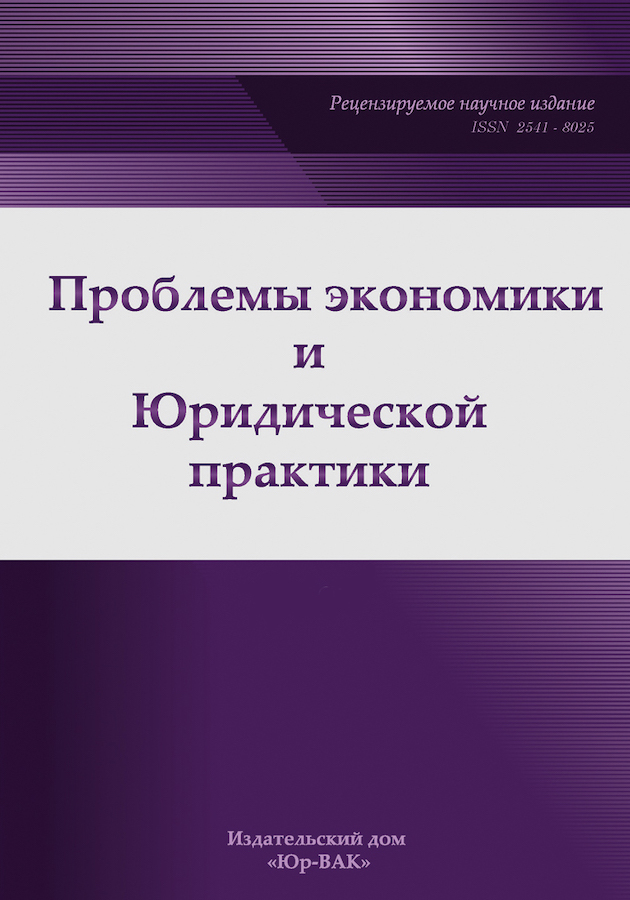Protection of restricted access information in GIS in the field of anti-corruption
- 作者: Zharova A.K.1
-
隶属关系:
- Financial University under the Government of the Russian Federation
- 期: 卷 19, 编号 5 (2023)
- 页面: 30-34
- 栏目: Public Law (State and Legal Sciences)
- URL: https://journals.eco-vector.com/2541-8025/article/view/626912
- EDN: https://elibrary.ru/NIUBZA
- ID: 626912
如何引用文章
详细
The purpose of the research is to analyze the legal protection of GIS in the field of prevention of corruption offenses and ensuring the protection of restricted access information during its processing in GIS. To achieve this goal, a comparative analysis of the main regulatory legal acts in the field of information security and anti-corruption is carried out. With the increasing integration of GIS into the life of society and administrative management, questions about the stability of the functioning of GIS, its security and the information contained in this system are becoming even more relevant.
Result. The Federal Law «On Combating Corruption» differs in approaches to the protection of information from the Federal Law «On Information», as well as with the Order of the FSTEC of Russia No. 17. The revealed inconsistencies in legal regulation and problematic places in the anti-corruption system do not allow forming a unified system of legal regulation in the field of anti-corruption and obtaining information through communication channels about corruption offenses committed, as well as determining the list and arsenal of legal means and methods available to public authorities, local governments, civil society institutions, organizations and individuals. To ensure anti-corruption, it is necessary to supplement the Federal Law «On Combating Corruption» with requirements for the protection of restricted access information transmitted through GIS channels about corruption offenses committed by taking technical measures, as well as organizational measures aimed at protecting restricted access information,» as defined in the Federal Law «On Information».
全文:
作者简介
Anna Zharova
Financial University under the Government of the Russian Federation
编辑信件的主要联系方式.
Email: anna_jarova@mail.ru
SPIN 代码: 2240-1467
Dr. Sci. (Law), Associate Professor, Leading Researcher and professor of the Department of Information Security
俄罗斯联邦, Moscow参考
- Achim, Monica Violeta, Viorela Ligia Văidean, Sorin Nicolae Borlea, and Decebal Remus Florescu. 2021. The Impact of the Development of Society on Economic and Financial Crime. Case Study for European Union Member States. Risks 9: 97. https://doi.org/10.3390/risks9050097.
- Aloev, U. Anti-Corruption Agency and Anti-Corruption Examination of normative legal acts: Comparative analysis / U. Aloev, Q. Rozimova // European Journal of Molecular and Clinical Medicine. —2020. —Vol. 7, No. 2. —P. 6364–6368. —EDN QJTPEY.
- Van Vu H., TTran. Q., Van Nguyen T., Lim Corruption S. Types of Corruption and Firm Financial Performance: New Evidence from a Transitional Economy / H. Van Vu, T. Q. Tran, T. Van Nguyen, S. Lim // Journal of Business Ethics. —2018. —Vol. 148, No. 4. —P. 847–858. —doi: 10.1007/s10551-016-3016-y. —EDN ZFMLUS.
- Liu, T. A. X. Understanding Corruption with Perceived Corruption: The Understudied Effect of Corruption Tolerance / T. A. X. Liu, W. J. Juang, C. Yu // Public Integrity. —2022. —doi: 10.1080/10999922.2022.2029095. —EDN XPTACO.
- Amelin R.V. The legal regime of state information systems: monograph / edited by S.E. Channova. M.: GrossMedia, 2016. 338 p.
- Amelin R.V. Legal relations in the sphere of creation and use of state information systems. Administrative and municipal law. 2017. No. 9. pp. 32–49.
- Batrova T.A., Zherebtsov A.N., Averina K.N., Vedysheva N.O., Vorontsova E.V., Menkenov A.V., Chernus N.Yu., Belyaev M.A., Kotukhov S.A., Timoshenko D.A., Yugova L.I. Commentary to the Federal Law of March 30, 1999 No. 52-FZ «On sanitary and epidemiological welfare of the population» (article by article). SPS ConsultantPlus. 2022.
- Beketova N.A. How to properly and reliably protect confidential information? HR practitioner. 2022. No. 2. pp. 133–176.
- Vorobyov, A.V. Modern approaches to the concept of corruption, corruption crime and corruption crimes / A.V. Vorobyov. Business in law. Economics and Law Journal. —2015. —No. 4. —pp. 112–115.—EDN UFGIWD.
- Elin V.M. The use of data protection technologies in the activities of law enforcement agencies. Russian investigator. —2022. —No. 10. —pp. 61–65. —doi: 10.18572/1812-3783-2022-10-61-65.
- Zharova A.K. Ensuring the protection of the state from computer attacks in the ICT sphere. Proceedings of the Institute of State and Law of the Russian Academy of Sciences. —2022. —Vol. 17, No. 4. —pp. 100–125. —doi: 10.35427/2073-4522-2022-17-4-zharova.
- Zharova A.K. Legal regulation of relations in the field of prevention of possible vulnerabilities in information technologies. Business security. 2022. No. 1. pp. 19–26.
- Kozhevina O.V. National legal regimes of Russia and France in the field of digital security: comparative analysis. Law and digital economy. 2020. No. 2. pp. 12–16.
- Miron, A. G. Theoretical approaches to the correlation of the concepts of «corruption», «corruption crimes» and other corruption offenses / A. G. Miron. Legal fact. —2022. —No. 192. —pp. 24–27. —EDN AUVICJ.
- Narutto S.V. The secret of communication (Prepared for the ConsultantPlus system). SPS ConsultantPlus. 2023.
补充文件








